
ЧАСТНО ПОЛЗВАНЕ НА ПУБЛИЧНИТЕ ГРАДСКИ МЕСТА. АКТУАЛНИ ПРОБЛЕМИ И ПРАВНИ РЕШЕНИЯ НА ДРЕВЕН РИМ
Private uses of public places in the city. Current problems and legal solutions of ancient Rome.
More...We kindly inform you that, as long as the subject affiliation of our 300.000+ articles is in progress, you might get unsufficient or no results on your third level or second level search. In this case, please broaden your search criteria.

Private uses of public places in the city. Current problems and legal solutions of ancient Rome.
More...
Without having ecological awareness and environmental protection, from the Roman law there is concern about the salubritas public of the living spaces. Salubritas and urbanism are concepts that are linked to this end and have served as a key category for the organization , policy analysis, case law and legal practice in relation to the organization of life in society. Study of the concept of urbanism in Roman law and the definition and legal nature of the limitations of property for reasons of public interest. Ruins of buildings and their environmental impact: they are the objective of this work that aims to summarize a global vision of the concern of the Roman jurists for the preservation of the urban environment, making their cities habitable places subject to a high level of development regulations. Likewise, it is outlined the analysis of the legal consequences of the damages produced by buildings in bad state of conservation, determining the legal nature of the responsibility in which the owners and their consequences incur in these cases.
More...
The object of this study is to identify similarities and differences between State Treasury in Ancient Rome – aerarium or fiscus, their administration and the employees. Special attention is paid to the fiscal justice and the role of the advocati fisci, as well as to the protection of the private interests in fiscal trials.
More...
This note makes some remarks on a recent volume, edited by eminent scholars in ancient history and epigraphy, that provides a new edition of the inscription that carries the regulations for the customs dues of the Roman province of Asia: together with a translation into English and a rendering of the text back into Latin, the reader will find in the book an excellent line-by-line commentary assigned to six scholars, and five essays brought out from the text of the customs law itself on themes of importance for the administrative, social and political history of the Roman Empire. The volume will certainly become a fundamental reference tool for the scholars of ancient Rome, and in particular for those interested in the Eastern part of the Empire.
More...
The Voluntary Jurisdiction Law 15/2015, modernize Justice in this subject, with the will of assuring its permanence in the future, in a decidedly technical sphere of the Jurisdictional Order.
More...
A complex of legal norms governing the determination of public receivables by type, reason and amount for their redemption, which differentiate a legal institute called “Financial Automatism”, stand out in the normative structure of public finances. A characteristic of its legal regime is that the lawful coercion, manifested in a financial act, is not necessary for determining the amount and the time limits for payment of public receivables and for their redemption. “Financial Automatism” is a realization of the principle of legality in terms of defining and collecting of material tax liabilities, and is a manifestation of both direct and indirect taxes.
More...
Since Croatia’s establishment as a sovereign country in the early 1990s, foreign investments have been identified as a strategic priority of its economic policy. Croatia seeks to provide a stable legal environment for foreign investors through its domestic rules, EU law or bilateral investment treaties. Providing legal protection in international investment disputes is a challenging task, and requires careful balancing between protecting private investor interests and the public interest in the State of investment. Entrusting this task to ad hoc arbitration tribunals, which adjudicate based on a specific body of investment law, and its open concepts, has been under increasing criticism, leading to a conclusion that the characteristics that distinguish arbitration from court proceedings are, at the same time, its greatest shortcomings. On the trail of this reflection, and following the Achmea case, there is increasing advocacy for establishing a special EU court for international investment disputes. This paper focuses, however, on the investment dispute resolution before ICSID involving Croatia either as the respondent or the home state in the last half decade.
More...
The harmonisation of the European Union's Digital Services Law epitomises a joint collaboration in the making of a legal framework where innovation and economic growth may find fertile ground. The convergence of such legal frameworks would not turn out to be an idle bureaucratic practice, but a visionary step toward a digitally integrated Europe. This harmonisation process means evading legal uncertainties and incoherencies deterring the smooth delivery of digital services by bringing national laws into line with overarching EU directives. This study, therefore, seeks to look at the detailed legal and regulatory framework that shapes the notion of a unified Digital Single Market in the European Union. With services crossing borders so easily, this article explains the subtle balance that has to be struck in a bid to nurture innovation while maintaining consumer rights, non-distorted competition, and data privacy. The narrative meanders to the pivotal legislative milestones of the Digital Services Act and the Digital Markets Act as a way to appraise the transformation this will exact on service providers and consumers alike. It contemplates the subtleties of cross-border data flows, dismantling barriers to digital trade, and emphasising harmonisation at the level of national rules in this domain. By providing a comprehensive analysis of current policies and landmark decisions of the European Court of Justice, the article underlines an urgent need for a smooth-acting, responsive legal framework - one that will foster the growth of the digital economy while protecting the fundamental rights of citizens. It further emphasises the ethos of collaboration amongst member states in the EU and stands to uphold a uniform approach in the mastering of the complexities surrounding service provision in the digital market, displaying that the DSM is resilient and inclusive in the whirlwind created by technological evolution.
More...
The paper puts face to face the blockchain technology and the services attached to it in the field of Decentralised Finance (DeFI) as it tries to answer to questions related to the efficiency of its use and the means to regulate this type of new financial services. At the same time, it proposes a series of technical and legislative solutions in order to mitigate the risks for businesses and consumers and to prevent any systemic dangers for the financial and banking system.
More...
i) The High Court finds that the defendant-appellant's claims are well-founded, arguing that the court of appeal conducted an incorrect examination of the conditions set out in Article 4(1) of Law no. 193/2000 regarding the early repayment fee. Relevant to the validity of this criticism are the CJEU rulings in case C-621/17 and the joined cases C-224/19 and C-259/19. ii) In light of these considerations, the High Court of Cassation and Justice finds that the court of appeal correctly applied the provisions of Article 1578 of the Civil Code, determining that the disputed clause, from the perspective of Law no. 193/2000, reflects the principle of monetary nominalism—a supplementary legal norm applicable, as recognized by the Court of Justice of the European Union in its recent ruling, to the legal relationship in question in the absence of a different agreement between the parties.
More...
Separate from the possibility of requesting suspension within an enforcement challenge—where both the enforcement process itself and individual enforcement acts can be contested—the legislator has also provided for the suspension of the enforceable title that serves as the basis for enforcement. This can occur within the substantive action challenging its legality when the title is represented by an authenticated document, in cases provided by law (Article 638, para. 2 of the Civil Procedure Code), or by a credit instrument or another document recognized by law as having enforceable power (Article 638, para. 1, point 4 of the Civil Procedure Code). The rationale for suspension in this situation is to prevent the damage that could be inflicted on the debtor when the enforceable title underlying the enforcement process is flawed in a way that renders it either unsuitable for enforcement or affects the existence, scope, or exigibility of the debt it establishes. While a suspension based on Article 719 of the Civil Procedure Code may cover the entire enforcement process, the suspension regulated by Article 638, para. 2 of the same code is limited to the title that is the subject of the annulment action. If an annulment request is not filed alongside the mortgage contract, the mere accessory relationship between a real estate mortgage and the secured debt is not sufficient to automatically suspend the enforcement of the mortgage contract solely as a result of suspending the credit agreement’s enforcement. This is particularly relevant given that, in principle, the lack of an enforceable nature of the credit agreement does not, by itself, prevent the enforcement of the mortgage contract—as established by Decision no. 60/2017 of the High Court of Cassation and Justice, issued by the Panel for Resolving Legal Issues.
More...
CJEU, Tenth Chamber, judgment of October 24, 2024, case C-347/23.
More...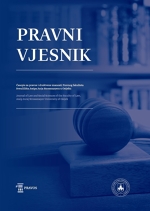
The paper presents the development of Chinese contract law, which underwent significant legislative changes from the 1980s until the adoption of the Civil Code of China in 2020. Although the legislative models of Croatian and Chinese legislators largely overlap, the paper discusses whether Chinese law comprises any specific solutions, particularly influenced by the ideological philosophies, of Confucianism and communism, which prevail in Chinese culture and legal system. The paper examines the specifics of concluding the sale of goods contracts between Croatian and Chinese traders. The research questions deal with the implementation of the UN Convention on the International Sale of Goods and legal challenges to the validity of contracts when Chinese law applies. The author identifies two key challenges to the validity of the contract according to Chinese law, namely its form and content, as well as the scope of application of the principle of party autonomy. Contractual solutions are proposed to avoid some dubious interpretations before the Chinese courts. In conclusion, this article contributes to understanding the context of Chinese commercial contract law and its legal framework, and enhances thereby the party’s legitimate expectations and the quality of drafting sales of goods contract when engaging in business with Chinese traders.
More...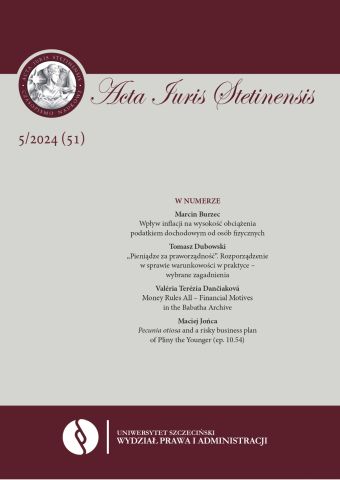
The Babatha Archive is a collection of legal texts, procedural or personal, most of which are written in Greek and present a probe into everyday life of persons of Jewish descent living at the beginning of the second century CE in the province of Arabia. Studying the Archive is not only valuable for legal history, but it also casts light on the relationship between the Jewish population of the era and the Roman administration, which is important for the study of the Second Temple Judaism as well. In the article, we want to introduce those papyri of the Archive that are the result of the expression of the will of the parties involved, whether by contract or another legal act. For these reasons we study papyri P. Yadin 5 (depositum), 11 (mutuum), 17 (depositum), 18 (marriage contract), 19 (donatio), 20 (concession of rights), 21 and 22 (emptio-venditio). At times we refer to other papyri that address similar situations. We want to point out the financial motivation for drawing these documents and with it also the need for securing the validity and enforceability of the obligations included in the selected documents.
More...
The Babatha Archive is a collection of legal texts, procedural or personal, most of which are written in Greek and present a probe into everyday life of persons of Jewish descent living at the beginning of the second century CE in the province of Arabia. Studying the Archive is not only valuable for legal history, but it also casts light on the relationship between the Jewish population of the era and the Roman administration, which is important for the study of the Second Temple Judaism as well. In the article, we want to introduce those papyri of the Archive that are the result of the expression of the will of the parties involved, whether by contract or another legal act. For these reasons we study papyri P. Yadin 5 (depositum), 11 (mutuum), 17 (depositum), 18 (marriage contract), 19 (donatio), 20 (concession of rights), 21 and 22 (emptio-venditio). At times we refer to other papyri that address similar situations. We want to point out the financial motivation for drawing these documents and with it also the need for securing the validity and enforceability of the obligations included in the selected documents.
More...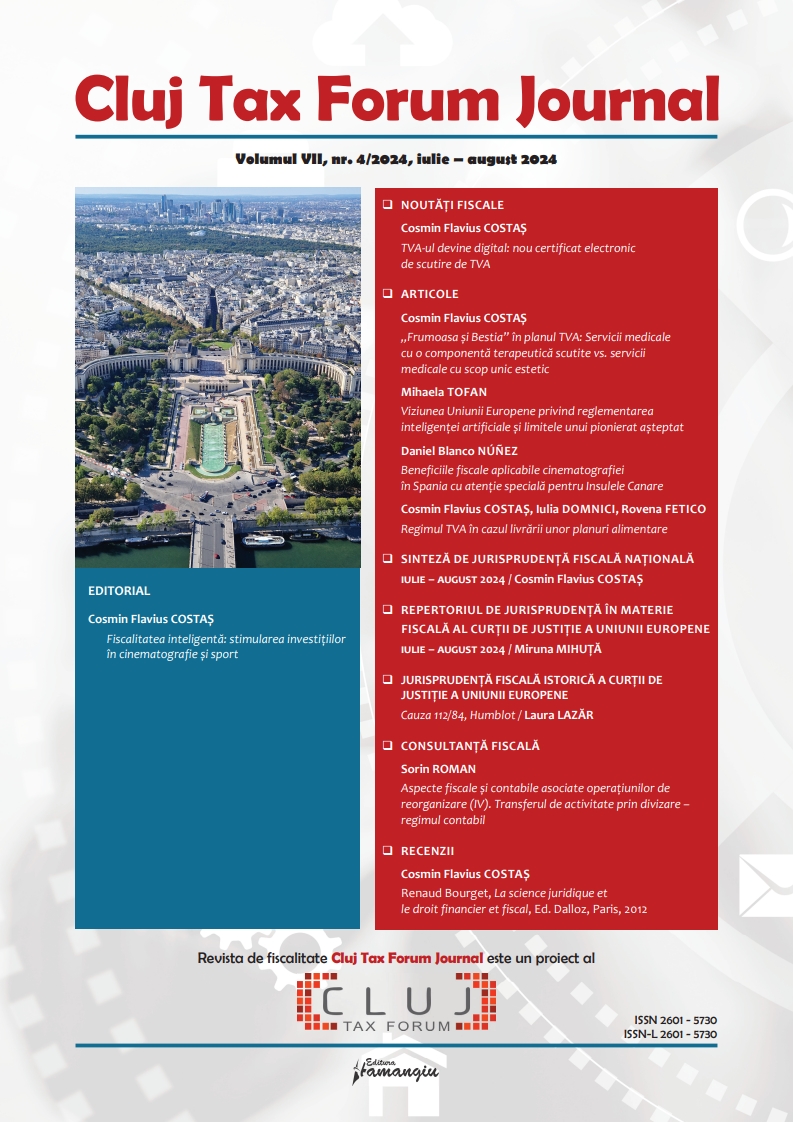
This article contains the following: Hotărârea Curții din 4 iulie 2024, cauza C‑179/23, având ca obiect o cerere de decizie preliminară formulată în temeiul articolului 267 TFUE de Înalta Curte de Casație și Justiție (România), prin decizia din 15 noiembrie 2022, primită de Curte la 21 martie 2023, în procedura Centrul Român pentru Administrarea Drepturilor Artiștilor Interpreți (Credidam) împotriva Guvernului României, Ministerului Finanțelor. / Hotărârea Curții din 4 iulie 2024, cauza C‑87/23, având ca obiect o cerere de decizie preliminară formulată în temeiul articolului 267 TFUE de Administratīvā apgabaltiesa (Curtea Administrativă Regională, Letonia), prin decizia din 14 februarie 2023, primită de Curte la 15 februarie 2023, în procedura Biedrība „Latvijas Informācijas un komunikācijas tehnoloģijas asociācija” împotriva Valsts ieņēmumu dienests. / Hotărârea Curții din 11 iulie 2024, cauza C‑182/23, având ca obiect o cerere de decizie preliminară formulată în temeiul articolului 267 TFUE de Naczelny Sąd Administracyjny (Curtea Supremă Administrativă, Polonia), prin decizia din 18 ianuarie 2023, primită de Curte la 22 martie 2023, în procedura Dyrektor Krajowej Informacji Skarbowej împotriva J.S. / Hotărârea Curții din 11 iulie 2024, cauza C‑184/23, având ca obiect o cerere de decizie preliminară formulată în temeiul articolului 267 TFUE de Bundesfinanzhof (Curtea Federală Fiscală, Germania), prin decizia din 26 ianuarie 2023, primită de Curte la 22 martie 2023, în procedura Finanzamt T împotriva S.
More...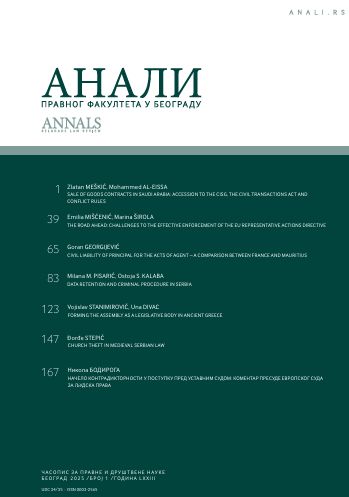
The rise of digital technology has driven progress but also enabled large-scale national and cross-border consumer law infringements. Unlawful digital practices threaten the internal market and the EU’s goal of high consumer protection. Directive (EU) 2020/1828 on representative actions aims to enhance enforcement by balancing access to justice and litigation abuse. Its key contribution is to ensure that consumers can seek injunctions and redress in all Member States. However, while a step forward, the Directive does not fully resolve issues of standing and funding, which hinder access to justice and effective enforcement. Addressing these challenges depends on the creativity and flexibility of national legislators, lawyers, and courts to make representative actions more practical and effective. This article examines the impact of the Directive and argues that additional efforts are crucial to overcome its limitations and ensure meaningful consumer protection across the EU.
More...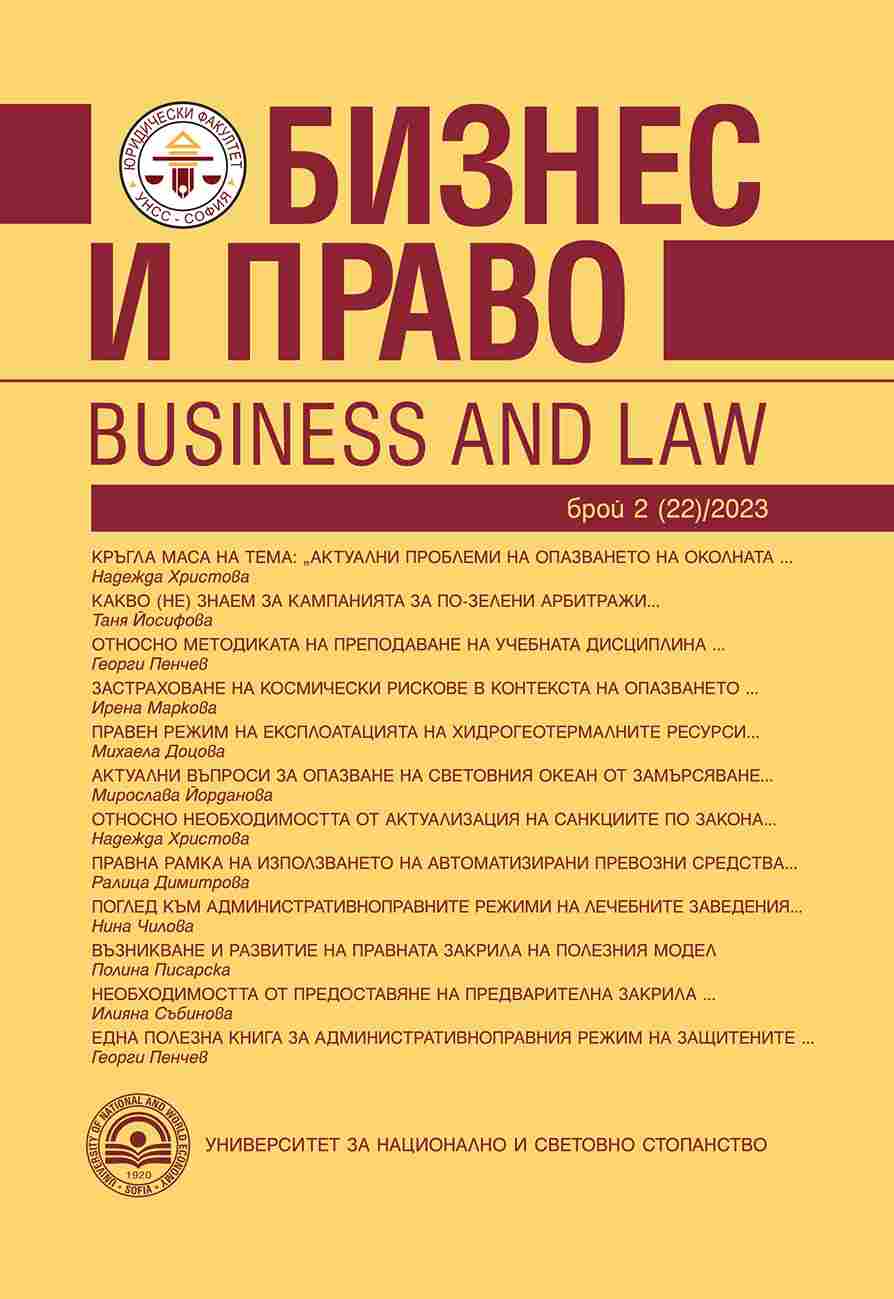
The utility model is an object of industrial property, also known as a „small invention“. The lack of a legal definition of the concept of a utility model in Bulgarian legislation creates disputes among the scientific community about its essence. The utility model enjoys legal protection in various countries, including the legislation of the Republic of Bulgaria. One of the first enactments to provide utility model protection was the German Patent Act of 1877. Other countries, including Japan, replicated decisions adopted in German law.
More...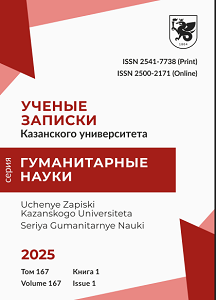
In times of geopolitical tensions and hostile political conditions, any state prioritizes defense capability programs and projects, including those in the fulfillment of the state defense order, to protect its independence and sovereignty. However, this also opens the door to financial crimes. To mitigate the risks of financial misconduct and streamline the defense procurement process, efficient and up-todate mechanisms of state financial control are needed. Using the existing approaches, this article defines the concept “principles of state financial control” applying to commercial and state entities fulfilling the state defense order. The theoretical principles of state financial control and their practical implementation within the legal framework of defense procurement in the Russian Federation were analyzed. Some amendments were suggested to Chapter 5.1 of Federal Law No. 275 of the Russian Federation covering the definition of the principles of state financial control in the field of the state defense order fulfillment.
More...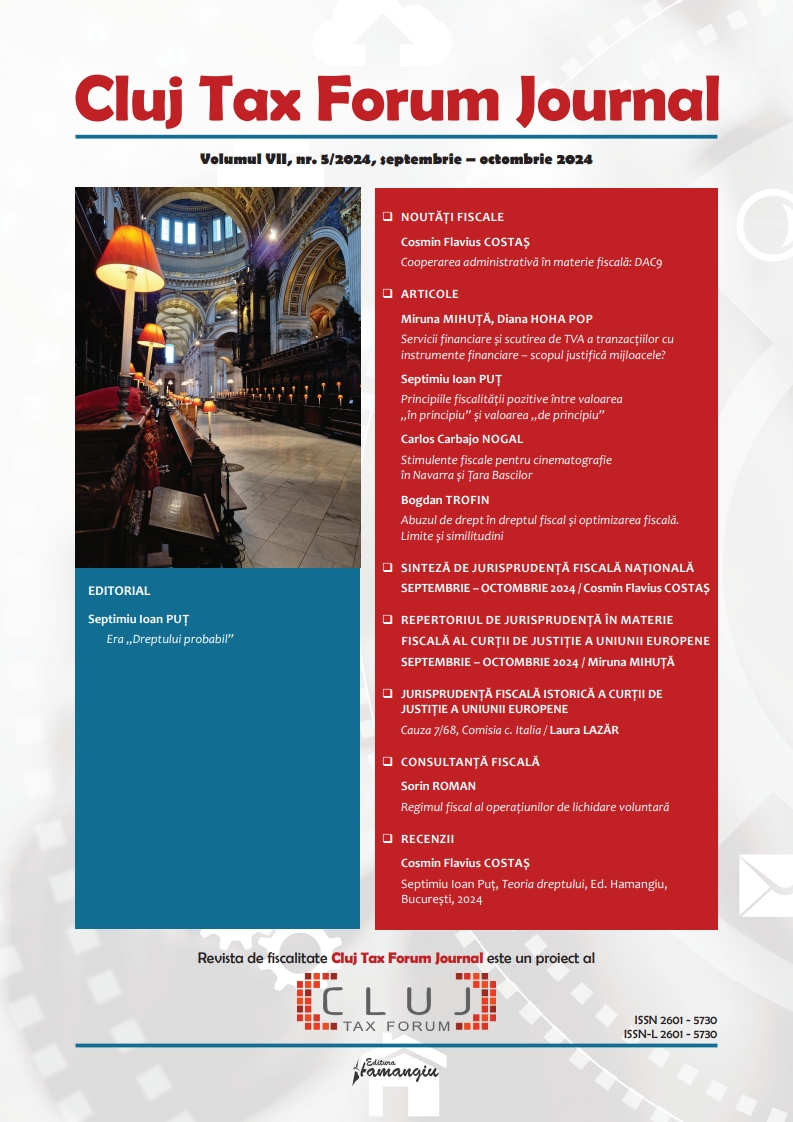
This study analyzes the favourable tax regime applicable in Navarra and the three Basque Foral Territories that affects cinematographic and audiovisual productions, which has recently been modified and expanded, increasing the tax incentives applicable to this important cultural sector that becomes a driving force for both regional communities.
More...